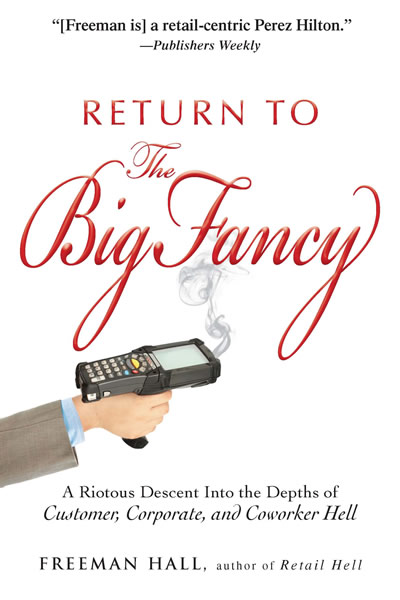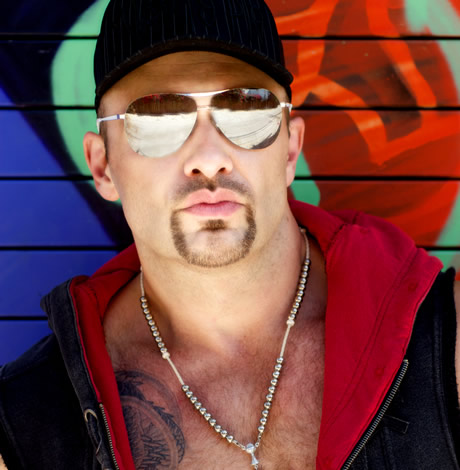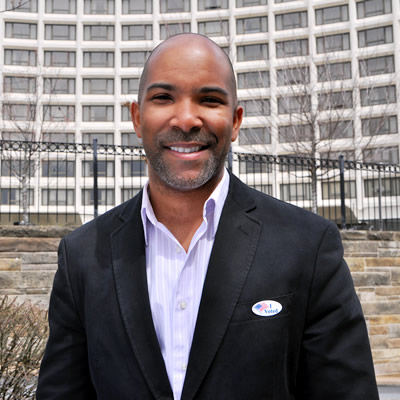Arts & Entertainment
Welcome to the jungle
Witty author shares retail experiences in new book

‘Return to The Big Fancy’
By Freeman Hall
Adams Media
$22.95
272 pages
The holidays are coming. That means you’ll need a little extra.
Extra time to go gift shopping, for sure, and extra closet space in which to hide packages. More importantly, you’ll need extra money for all that buying, which means you’re looking for an extra job.
There are a lot of openings at the mall, but be careful what you ask for. According to Freeman Hall in his new book “Return to The Big Fancy,” that part-time gig you’ll grab might just be extra irritation.
Freeman Hall figured he’d done his time at The Big Fancy, an upscale department store chain with a Burbank location. Hall worked the “Handbag Jungle,” where he dealt with nasty “custys,” greedy co-workers and a store manager he called Suzy Satan. He put up with them all while bringing home an insultingly small paycheck so when he got the chance, he escaped to pursue his dream of being a screenwriter.
But screenwriting didn’t pay the bills. Working at The Big Fancy did. Shortly after leaving, it was back to retail hell at Hall.
The new department manager of Handbag (never “purse”) Jungle was a wonderful woman Hall calls Maude and, since she knew about his past at The Big Fancy, she was happy to hire him. As a former handbag manager, Hall brought experience to the Jungle. He also brought back his best customers.
As for Hall, everything was familiar and depressing from the start.
Forbidden to use an elevator or mall entrance, employees were forced to climb several flights of stairs to get to work. Every day began with ear-splitting announcements and admonishments over the PA system from Suzy Satan to rally (or annoy) the troops. Since The Big Fancy paid its sales associates in commissions, “sharking” (stealing customers) was common and destroyed any sense of teamwork. Rules were loose (unless you broke them) and commissions could be retroactively withdrawn, even years later. The pressure on managers and associates was intense. Adding to it was that customers were always right — even when they weren’t — and discount rats always got their way.
It was frustrating. It was irritating. And it might’ve meant a completely horrible year for Hall, if it wasn’t for The Big Fancy christmas miracle.
So you plan on picking up some hours at the mall this fall. You might want to pick up “Return to The Big Fancy” first, while there’s still time to run.
Author Freeman Hill is both profound and profane in this book (although not as much of the latter as he was in his first book). His observations and his propensity for nickname-giving are both hilarious, but such snarkiness isn’t all you’ll find here: there are a few genuinely wonderful moments at the store and Hall shares them, too.
While retail-working readers will surely identify with this book, it will also give non-retailers a taste of what’s behind the counter. Either way, if you’re getting malled this holiday season, you’ll need a laugh and “Return to The Big Fancy” packs a lot of extras.

Team DC, the umbrella organization for LGBTQ-friendly sports teams and leagues in the D.C. area, held its annual Night of Champions Awards Gala on Saturday, April 20 at the Hilton National Mall. The organization gave out scholarships to area LGBTQ student athletes as well as awards to the Different Drummers, Kelly Laczko of Duplex Diner, Stacy Smith of the Edmund Burke School, Bryan Frank of Triout, JC Adams of DCG Basketball and the DC Gay Flag Football League.
(Washington Blade photos by Michael Key)




















The 2024 National Cannabis Festival was held at the Fields at RFK Stadium on April 19-20.
(Washington Blade photos by Michael Key)
















Covering the @NatlCannaFest at RFK Stadium for @WashBlade . Stop by the LGBTQ+ booth and pick up a paper if you are here. pic.twitter.com/is7hnsaPns
— Michael Patrick Key (@MichaelKeyWB) April 20, 2024
Theater
‘Amm(i)gone’ explores family, queerness, and faith
A ‘fully autobiographical’ work from out artist Adil Mansoor

‘Amm(i)gone’
Thorough May 12
Woolly Mammoth Theatre
641 D St., N.W.
$60-$70
Woollymammoth.net
“Fully and utterly autobiographical.” That’s how Adil Mansoor describes “Amm(i)gone,” his one-man work currently playing at Woolly Mammoth Theatre.
Both created and performed by out artist Mansoor, it’s his story about inviting his Pakistani mother to translate Sophocles’s Greek tragedy “Antigone” into Urdu. Throughout the journey, there’s an exploration of family, queerness, and faith,as well as references to teachings from the Quran, and audio conversations with his Muslim mother.
Mansoor, 38, grew up in the suburbs of Chicago and is now based in Pittsburgh where he’s a busy theater maker. He’s also the founding member of Pittsburgh’s Hatch Arts Collective and the former artistic director of Dreams of Hope, an LGBTQ youth arts organization.
WASHINGTON BLADE: What spurred you to create “Amm(i)gone”?
ADIL MANSOOR: I was reading a translation of “Antigone” a few years back and found myself emotionally overwhelmed. A Theban princess buries her brother knowing it will cost her, her own life. It’s about a person for whom all aspirations are in the afterlife. And what does that do to the living when all of your hopes and dreams have to be reserved for the afterlife?
I found grant funding to pay my mom to do the translation. I wanted to engage in learning. I wanted to share theater but especially this ancient tragedy. My mother appreciated the characters were struggling between loving one another and their beliefs.
BLADE: Are you more director than actor?
MANSOOR: I’m primarily a director with an MFA in directing from Carnegie Mellon. I wrote, directed, and performed in this show, and had been working on it for four years. I’ve done different versions including Zoom. Woolly’s is a new production with the same team who’ve been involved since the beginning.
I love solo performance. I’ve produced and now teach solo performance and believe in its power. And I definitely lean toward “performance” and I haven’t “acted” since I was in college. I feel good on stage. I was a tour guide and do a lot of public speaking. I enjoy the attention.
BLADE: Describe your mom.
MANSOOR: My mom is a wonderfully devout Muslim, single mother, social worker who discovered my queerness on Google. And she prays for me.
She and I are similar, the way we look at things, the way we laugh. But different too. And those are among the questions I ask in this show. Our relationship is both beautiful and complicated.
BLADE: So, you weren’t exactly hiding your sexuality?
MANSOOR: In my mid-20s, I took time to talk with friends about our being queer with relation to our careers. My sexuality is essential to the work. As the artistic director at Dreams of Hope, part of the work was to model what it means to be public. If I’m in a room with queer and trans teenagers, part of what I’m doing is modeling queer adulthood. The way they see me in the world is part of what I’m putting out there. And I want that to be expansive and full.
So much of my work involves fundraising and being a face in schools. Being out is about making safe space for queer young folks.
BLADE: Have you encountered much Islamophobia?
MANSOOR: When 9/11 happened, I was a sophomore in high school, so yes. I faced a lot then and now. I’ve been egged on the street in the last four months. I see it in the classroom. It shows up in all sorts of ways.
BLADE: What prompted you to lead your creative life in Pittsburgh?
MANSOOR: I’ve been here for 14 years. I breathe with ease in Pittsburgh. The hills and the valleys and the rust of the city do something to me. It’s beautiful, it’ affordable, and there is support for local artists. There’s a lot of opportunity.
Still, the plan was to move to New York in September of 2020 but that was cancelled. Then the pandemic showed me that I could live in Pittsburgh and still have a nationally viable career.
BLADE: What are you trying to achieve with “Amm(i)gone”?
MANSOOR: What I’m sharing in the show is so very specific but I hear people from other backgrounds say I totally see my mom in that. My partner is Catholic and we share so much in relation to this.
I hope the work is embracing the fullness of queerness and how means so many things. And I hope the show makes audiences want to call their parents or squeeze their partners.
-

 South America4 days ago
South America4 days agoDaniel Zamudio murderer’s parole request denied
-

 Maryland5 days ago
Maryland5 days agoMontgomery County police chief discusses arrest of trans student charged with planned school shooting
-

 State Department23 hours ago
State Department23 hours agoState Department releases annual human rights report
-

 Theater4 days ago
Theater4 days ago‘Amm(i)gone’ explores family, queerness, and faith









